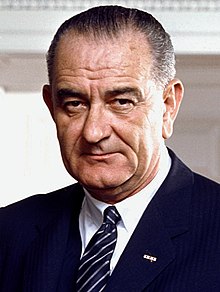
| ||
|---|---|---|
|
Senator from Texas
37th Vice President of the United States 36th President of the United States
First term
Second term
Presidential and Vice presidential campaigns
Post-presidency
|
||
The United States foreign policy during the 1963-1969 presidency of Lyndon B. Johnson was dominated by the Vietnam War and the Cold War, a period of sustained geopolitical tension between the United States and the Soviet Union. Johnson took over after the Assassination of John F. Kennedy, while promising to keep Kennedy's policies and his team.
The U.S. had stationed advisory military personnel in South Vietnam since the 1950s, but Johnson presided over a major escalation of the U.S. role in the Vietnam War. After the 1964 Gulf of Tonkin incident, he obtained congressional approval to use military force to repel future attacks by North Vietnam. The number of U.S. soldiers increased from 16,700 soldiers when Johnson took office to over 500,000 in 1968, but North Vietnamese and Viet Cong forces continued fighting despite losses. Domestic resistance to the war grew throughout Johnson's presidency, and especially after the 1968 Tet Offensive. Johnson was unsuccessful in his efforts to reach a peace agreement during his final days in office, and the war continued.
Johnson pursued conciliatory policies with the Soviet Union, but stopping well short of the détente policy Richard Nixon introduced in the 1970s. He was instead committed to the traditional policy of containment, seeking to stop the spread of Communism in Southeast Asia and elsewhere. He continued Kennedy's Alliance for Progress policies in Latin America and successfully pressured Israel to accept a cease fire in the Six-Day War.
© MMXXIII Rich X Search. We shall prevail. All rights reserved. Rich X Search


